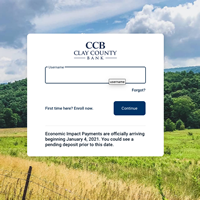Security
Security and Safety at Clay County Bank
Phishing
“Phishing”, according to Webopedia.com, is “the act of sending an e-mail to a user falsely claiming to be an established legitimate enterprise in an attempt to scam the user into surrendering private information that will be used for identity theft.” The e-mail directs users to a false website containing logos, links and the look of real company websites. The e-mail presses a sense of urgency, threatening to close accounts, change security settings, or update accounts. Victims are asked to update personal information, such as passwords and credit card, social security, and bank account numbers. A recent report by the security company SymantecTM stated the second half of 2004 marked an increase of 300% in phishing attempts. They are predicting a rise in these attempts at identity theft over the next year.
Our Policy
CCB does not send e-mails asking for personal account information such as account numbers, passwords, social security numbers or other sensitive information. If you do receive any e-mail asking you to confirm, update or link to our website, assume this is a fraudulent attempt to illegally acquire information. Please notify CCB immediately if you receive any suspicious correspondence.
CCB assures you that CCB Online business transactions are done through a secure internet connection. The VerisignTM logo, the “lock” icon at login, and the https:// that begins the website address are ways to verify your safety. By clicking the VerisignTM logo, you can confirm the authenticity of a secure site.
How to protect yourself
- DON’T share your username and password with anyone.
- DON’T click on links within e-mails. Always type the URL website address into your browser.
- NEVER provide anyone with personal information from unsolicited e-mail, phone or pop-up website requests.
- NEVER e-mail your personal account information such as account numbers, usernames, or passwords to anyone. Simply contact us first and we will respond accordingly.
- DO change your passwords frequently and keep them safely guarded.
- DO keep anti-virus software and other security software updated
- CONTACT the Federal Trade Commission to report suspicious activity at http://www.ftc.gov.
Additional information regarding identity theft is available at http://www.antiphishing.org/consumer_recs.html
Identity Theft
If you are concerned that someone has unauthorized access to your personal information, please call us immediately at 304-587-4221 so we can take steps to help protect you. You should also consider reporting your concerns to:
- Our local law enforcement officials
- The Federal Trade Commission identity theft hotline at 877-ID-THEFT.
- The Social Security Administration fraud hotline at 800-269-0271.
- Your credit card companies. Remember, knowing where to find your credit card information and toll-free contact numbers will help in an emergency.
- National credit reporting organizations that can place a fraud alert on your name and Social Security Number.
- Equifax: 800-525-6285
- Experian: 888-397-3742
- Trans Union: 800-680-728
Additional information regarding identity theft is available at http://www.ftc.gov/bcp/edu/microsites/idtheft/
Fraud Resources http://www.idtheftcenter.org/index.html

